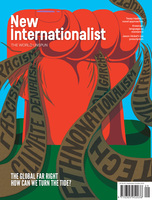
Bigger fish to fry
Your cover story Can mining save the world (NI 555) rightly flagged that mining is a dirty business, which routinely tramples on the rights of local communities and is involved in corrupt deals with political elites. But due to a lack of context, I felt that the overall picture painted was highly misleading.
Your story gives the impression that the main driver of mining demand is the energy transition, especially renewables and EV batteries. So maybe, one might conclude, if we curb demand for these things, we will slow down the ‘massive increase in mining’ they require and become less extractive? This is completely wrong.
In reality, the three ‘critical minerals’ you focused on – lithium, nickel and cobalt – together only account for about 0.13 per cent of the total volume of metals mined each year. (Even within that slice, most nickel, and almost half of cobalt and lithium, is used for purposes entirely unrelated to the energy transition! To give one example, all conventional petrol cars are made using stainless steel – a material which is about 8-10 per cent nickel.) So yes, your piece was entirely right that we need to reduce minerals, demand and waste, and rapidly move to a recycled minerals circular economy model.
But if we’re serious about changing extractivism, shouldn’t these efforts aim to tackle the 99 per cent of metals mining that’s un-related to the energy transition, not just the 1 per cent that is?
‘China is a threat’
In the July/August edition (NI 556) I was perturbed to read an article by Vijay Prashad asking rhetorically if China threatens the US with invasion ‘or even any other country’? What about Taiwan and the vexed question of Tibet? Of course, the Chinese government also threatens and oppresses its own people – the Uyghurs, people in Hong Kong and political dissidents generally. In writing this I’m not in any way attempting to justify the Western approach to international relations – I spend time campaigning against much that is very wrong with UK policy.
‘Whose side, really?’
I received the latest copy of the New Internationalist today (NI 556) and was really impressed by the hard-hitting and politically revealing articles.
However there were two articles that really bothered me. The first was in the ‘Briefly’ section (page 9) on Mali. It was a negative commentary that could have come straight out of mainstream media such as the BBC or The Guardian. In this tiny article were words like ‘junta’, ‘authoritarian’ and ‘delays to elections’; the same comments that come from Western leaders who are furious at losing the control of their ‘colonies’. I heard Emanuel Macron spitting out the word ‘putsch’ as he referred to Mali and the other two countries in the Sahel that have broken their ties from French colonial domination.
Let’s be clear, there is always a danger in any political leadership, but this is way too early to start levelling criticism at a country that has only recently broken from brutal colonial rule.
The second article is under View from Africa, ‘Beware the glorified military man’, and it is critical of Ibrahim Traoré in Burkina Faso. The author Rosebell Kagumire acknowledges his immense popularity across Africa, a popularity that has sparked widespread hope for change. What she says are the same things are said after every revolution, and the aim has always been to roll back progress. It’s such an old playbook.
To get to the core of this; you can’t be a progressive news outlet, and a fuzzy liberal news outlet at the same time. It is either one or the other.
Why I...
...started a community film festival.
As a filmmaker, I believe that films hold more power than to simply entertain. Films can amplify voices, spark conversations and fuel action. That’s why I launched the Stories of Strength (SOS) Film Festival: an annual charity event hosted in Brighton that champions issues through the lens of independent cinema. Each year, we support a new cause, hoping to shed light on topics that need urgent support or don’t get the attention they deserve, from basic human rights to combatting the genocide in Gaza. We curate documentaries that speak to the resilience, hope and strength of communities around the world. This isn’t just another flashy red carpet event; it’s a community-led celebration of stories that matter.

